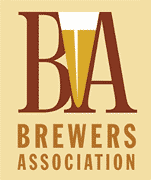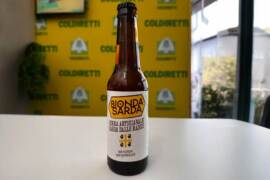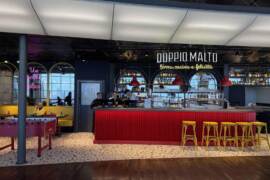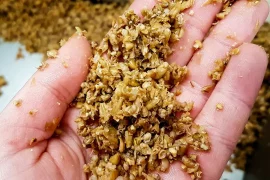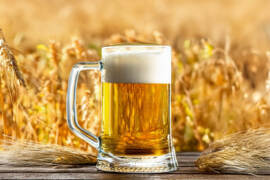© Riproduzione riservata
KUASKA
Direttore culturale di Unionbirrai
Degustatore Professionale di Birre
Life Member of CAMRA
www.kuaska.it
SUMMARY: Introduction – My strong relations with the world of US craft beers
Temporal reference: May 2008
Concerning how it happened that, in slightly more than 20 years, the US craft beer movement subverted the local consumers’ drinking habits and turned into a beacon that is being followed enthusiastically by many countries.
Introduction
American craft beer has reached an indisputed, well-deserved leading position on a global level for both quality and variety – two variables that are worth far more than dry market numbers to any “extreme” beer-tasting expert such as myself. This statement might well sound astonishing to less-than-informed readers (those who live contentedly in their ivory tower, clinging to positions and opinions that are by now way out of date), but will come as no surprise to those Internet denizens who know how to keep abreast of facts and feel the on-line pulse of this world that is finally starting to awaken and shake off a troubling stagnation.
American craft brewers have been protagonists, since the start of the Eighties, of the thrilling movement that has been deservedly and proudly nicknamed “Renaissance”. And yet it looked as if there would be no way back, due to the American consumer’s flattened sensorial and flavour-related perception. Those sapid beers of old, lovingly crafted in isolated “farmhouses” during long, lazy winters by immigrant “farmers” from all over the world (who had brought with themselves, out of homesickness, the recipes of their beloved traditional beers) were long gone.
The market – and consequently, American people’s parched throats – were flooded with dull “light lagers”, obviously filtered and pasteurized, virtually flavourless and without fragrance, in which the weird creeping plant called hops was shunned as a dangerous, unwelcome guestIn the beginning, pioneers only used to produce imitations of the styles they had discovered and appreciated while travelling in Europe. It was easy to guess where each of the producers had been “enlightened”… If he was brewing pils, bock, weizen etc, then he had been “initiated” in some biergarten in Bavaria. If he produced bitter, IPA, porter and stout, he had obviously been “infected” in the U.K., whereas if he made a saison or bière blanche, the “revelation” had clearly been bestowed on him through the rich ambience of a Belgian coffee bar.
It was too early to speak of “American” styles proper, yet today – after more than a quarter of a century – there are over 20 autochtonous styles, all of them “made in the U.S.” It is worth pointing out how some of them are to be seen as of styles that have lost people’s favour in their home countries, such as American Pale Ale and Imperial Stout. Still more curious is the fact that many respected European producers are now clearly borrowing ideas from their former “pupils”, as testified by the much-hopped ales that are being brewed in Belgium, Scandinavia and our own country. The ongoing evolution in quality and quantity led the US craft brewers to become protagonists of the modern scenery of quality beer.
My strong relations with the world of US craft beers
My first real contact with the new craft beers from the U.S.A. dates back to the start of the Nineties, when friends and colleagues brought me the first ales. California’s Liberty Ale (by Fritz Maytag, Anchor Steam’s pioneering brewer) and Sierra Nevada Pale Ale were the “tools” I used to “coach” myself, so that I could tackle the West Coast’s new, aromatic, heavenly hops.The scents of grapefruit and resin, so typical of Cascade, seduced me even since the first tasting. In 1995 – while travelling between New York, S. Francisco and Los Angeles – I had the fist inkling that something groundbreaking was happening. Since I’ve been working for over 15 years now at GBBF in London – in the hard-fought BSF (Bières Sans Frontières) section, devoted to beers from outside the U.K I got the chance to sample beforehand quite a few beers made by small American producers (expertly and lovingly chosen by my good friend Johnatan Tuttle, the kind, bearded giant from Massachussets).
Then I made another big step thanks to Charlie Papazian, father of the American movement (who has been actively attending the main Italian events, such as Pianeta Birrai and Salone del Gusto in Torino, alongside with his team of competent brewers and helpers.
Yet it is indisputedly since 2004 – that is, since I’m convoked regularly to be a member of World Beer Cup’s prestigious jury – that my knowledge (alongside with a true, spontaneous feeling of brotherliness linking me to the most daring artisans) grew exponentially, until I ended up gaining a popularity and general esteem that I find, sometimes, quite embarassing… Such as when I last visited the East Coast in November 2006, on an exhausting, yet gratifying tour that saw me holding as much as 16 public tastings throughout a mere week. I think no other Italian guy sampled more American beers than myself. I’ve been literally “adopted”, and I’ll admit I’m by now forever in love with this wonderful world.
Judging – especially as far as peculiarly American categories are concerned, such as pale ale – allowed me to refine my skill and broaden my horizons. The ambience is simply gorgeous. We, the judges – while busy concentrating on more than 140 beers, during 4 sessions over two days – are cuddled and tended, with unfailing professionality, by diligent promoters and qualified stewards, so that I can’t remember an unpleasant episode ever influencing my standard criterion.
And what about the GABF (Great American Beer Festival), turning Denver into the capital of U.S. quality beer every year? In a relaxed, unstrained environment, one gets to sample a seemingly endless number of beers, virtually covering all of the world’s brewing styles (ranging from classical, traditional ones to the most unusual and extreme ones).
I met many brewers and was always impressed, not only by their competence, but especially by the ease with which they seem to become friends with colleagues (who are not seen as rivals, but as travelling companions with whom a reationship can be built by acknowledging mutual respect and learniong from each other). I saw with my very eyes some well-known brewers liberally sharing their expertise with green “beginners”.
Besides getting a chance to repeatedly taste beers from every corner of the U.S.A. (by visiting Western states such as Washington and California, central ones such as Colorado and Eastern ones like Connecticut, Maryland, New York and D.C.) I could experience different realities firsthand, all of them exciting and bearing evidence of how craft beer has by now gradually crept into the American consumers’ everyday life.
Supermarket shelves are still the domain of anonymous lagers produced by multinationals, yet there is also a broad choice of craft beers on them, which is something I’d like to see in our country as well, despite the resistance put up by our brewers. Some established owners of well-stocked wine shops are just now starting to devote increasing spaces to craft beer, selected with the same care they lavish on the most classical, glamorous wines.
Small producers’ beers can often be found in unexpected places: street markets’ stalls, museums’ bars and even at some airports’ buffets (such as the super-busy one in Atlanta, where you’ll find a good pint of Peachtree Pale Ale – by a local brewery, Atlanta Brewing Company – at the Red Brick Tavern, gate T-4).
It goes without saying, then, that in the “appointed” places – such as pubs and brewpubs – beer lovers will find true paradise. In some states the choice is so wide and diversified as to astonish even the most jaded beer expert from Europe.I remember Tap House in Bellevue, near Seattle – it had been recommended to me by Arville Harris, Issaquah Brewery’s brilliant brewer – where it took me over 15 minutes to read through an impressive list of 160 tap beers, all of them available! And that was not an isolated phenomenon, either. I’m really trying here to stir in you all a longing to visit the States on your next beer-hunting trip, by pointing out my favourite places – well-known beer temples as well as tiny bars – for you to enjoy some unforgettable experiences.
Let’s start from the West – from the wonderful O’Brien pub in San Diego, the owner of which, Tom Nickel, is one of the most daring American brewers, as shown by his shocking Hop Juice beer, with over 100 bitterness units. At Solana Beach, forget about surfing but try Pizza Port instead, where a legend like Tomme Arthur will win you over with his Cuvée de Tomme, aged in oak barrels. Then go to San Francisco, stop at the gorgeous pub Toronado and let yourself be “tortured” by David Keene.. While in California, aim slightly northwards to Santa Rosa and do not miss the brewpub Russian River, where you’ll discover Vinnie Cilurzo’s magical world (see the interview).
After crossing exciting Oregon – which practically bursts with beer – have a quick trip to lovely Seattle, where you will find high-quality brewpubs such as Elysian, Hale’s, Big Time and above all the sumptuous Brouwers Café, obviously mimicking a Belgian café, with its 50 taps and 200 bottles. The final touch should be an educational tour of the hops plantations in nearby Yakima Valley. Move towards the central states, to evocative Colorado – possibly in autumn, when the Rocky Mountains acquire a thousand shades and, above all, the Great American Beer Festival is held in Denver. As soon as you are in the “One Mile High Town”, run to Falling Rock pub and loose yourself among its sixty-something tap beers
Have a short walk, so to speak, and you’ll be at Wynkoop Brewing Company, where a good “oktoberfest beer” like Railyard Ale will prove how American brewers managed not only to personalize the European styles, but sometimes even to perfect them. Do not leave town before visiting the premises of tiny, high-quality Flying Dog (try out their extra-hopped Wild Dog Double Pale Ale 2004) and Great Divide (don’t miss their powerful “oak aged” Imperial Stout – that is, a beer that was aged in durmast barrels).
In the surroundings of Denver, Boulder – home to the Brewers Association – deserves a stop. Of its thousand temptations do not miss Avery Brewing, where my dear friend Adam will delight you with incredibly high-quality beers such as “The Beast” (a beast indeed, biting into you with its 15 alcohol degrees!) Colorado – a true beer lover’s paradise – also bestows on us Logmont’s beautiful Left Hand, where our friend Eric Wallace – who speaks Italian perfectly, albeit with a strong, weird Friulan accent he got from his attractive wife – will welcome you to his excellent beers, starting with a creamy, thrist-quenching Milk Stout (containing lactose). Last but not least, here are a few more “tip-offs”: the brewpub Oskar Blues in Lyons offers really good music and superb beer cans (that usually rubs me the wrong way, but I swear those are truly great!), while a “very English” feeling can be experienced at the refined Cheshire Cat brewpub in Arvada, where Charles Sturdavant (who is Golden City Brewery’s master brewer as well) exerts his huge talent.
Finally, you really should make a little detour to Fort Collins to enjoy some extraordinary beers by the Flemish master Peter Bouckaert (formerly Rodenbach!) who found in New Belgium Brewing the ideal environment for him to produce sour beers, such as the multiple award-winning La Folie (aged in wooden barrels), and test out some really uncommon ingredients like wu-wei-zi (Schizandra Chinensis’ berries), goji berries or Artemisia Absinthium (the latter’s been employed for his Chiostro by Piccolo Birrificio at Apricale( IM)iIn Italy.
Let’s close our roundup with the East Coast, which – being jealous of the West Coast’s leadership – is now quickly reducing the gap, if nothing else qualitywise. Coming from the South – from Maryland – don’t miss two premises in beautiful Baltimora: the elegant Brewer’s Art (renowned for the exceptional food and, above all, for master brewer Chris Cashell’s beers; his masterpiece is a wonderful “Abbey dubbel” called Resurrection) and reliable Max’s on Broadway, carrying more or less 100 beer kegs (ironically labelled as “prescriptions” on a luminous sign!)
In tiny Delaware, let yourselves be carried off by a huge guy called Sam Calagione (see the lenghty interview), who created the jewel known as Dogfish Head – a dazzling “star-spangled” example of how it is actually possible to turn into a successful entrepreneur without sacrificing quality or betraying a lifetime’s philosophy. Philadelphia will dazzle you with Ludwig’s Garten and Grey Lodge Pub, but it will definitely bewitch you with its extraordinary Monk’s Cafè, run by a ruddy guy called Tom Peters with unfailing love and passion.
Once in New York, you will be spoiled for choice. I’ll point out such places as Gingerman, Barcade, Hop Devil Grill and Blind Tiger, but above everything else I heartily recommend Brooklyn’s awesome Spuyten Duyvil, which is really astounding due to the impressive list of new and rare beers that Joe Carroll’s experience manages to obtain.
Do not leave Brooklyn before visiting the famous brewery bearing the same name, where legendary Oliver Garrett – one of the movement’s greater pioneers, as well as an expert in beer/food pairings (that are nowadays so fashionable in the U.S.A. and other places, obviously including Italy). His best-selling book, “The Brewmaster’s Table”, should find a place on every beer lover’s bookshelf.
Our journey is nearly over, yet – after a quick cross of luscious Connecticut and a spectacular dinner washed down with some truly unexpected beers in its capital, Hartford, at the Half Door Pub – you’ll end up in Massachussets, where (of the thousand temptations of Boston and its surroundings) I strongly suggest you to dash into two extraordinary pubs such as Amherst’s The Moan and Dove and Brookline’s The Publick House, both picked as America’s best pubs by beer lovers surfing the famous web site “Beer Advocate”. You’ll get your stirrup cup “with a bang” in Portland, Maine, at the renowned Allagash Brewing Company where Rob Tod’s talent gave us – besides the very famous Allagash White – Interlude, a beer that is re-fermented in the bottle and aged in French durmast barrels, which gives it a strong winey quality.
You’re really itching to cross the Ocean and look for great beers, aren’t you? In the meanwhile you can practise right at home or in the best pubs and beer shops here in Italy, carrying some imported products among the ones mentioned in the article: Anchor Steam and Sierra Nevada, Sam Adams from Boston, Oregon’s more than inspiring Rogues (imported only recently) and many others that will reach the Old Continent very soon, gracing the glasses of beer lovers who have been waiting for them eagerly.
© Riproduzione riservata



